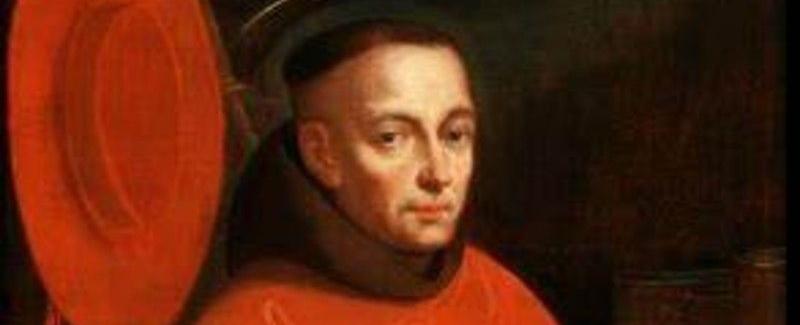Saint Bonaventure: Offering Us Light and Comfort

St. Bonaventure has been a saint that I’ve admired for a long time. I went to St. Bonaventure University, and I was baptized at a parish named after him as well.
But it’s only within the last few years that I’ve come to appreciate, respect, and pray with the Seraphic Doctor on a more profound level. While July 15 has always been a special day for me and for Franciscans the world over, reflecting on Bonaventure recently has been particularly meaningful.
We live in a very fractious world. It’s not hard to look around us and be discouraged by the seemingly irreconcilable tensions, the lack of constructive dialogue, the outright violence (both in word and in deed) that is wrought in our society. The Church, too, seems to be divided into warring camps over politics, the liturgy, and our very identity.
It’s perhaps helpful to remind ourselves that these dynamics aren’t unique to our own day and age. Polarization and discord are as old as the human condition, and they were certainly rampant in the 13th century. The example of St. Bonaventure, I sincerely believe, can offer us light and comfort as we try to make our way forward among the conflicts that mark our own time.
Reconciling Polarities
1257 was not, to put it mildly, an idyllic time in Franciscan history. Tensions were high within the Order, with factions of brothers upset at the increasingly clerical makeup and the perceived betrayal of St. Francis’ ideals.
Add to this the pressures from the outside. Many members of the secular clergy were suspicious of the relatively new Order and frustrated by the many privileges given them by the ecclesial hierarchy. Charges of heresy were leveled against the Franciscans, charges that would only gain steam when the Minister General at the time, John of Parma, himself lent heretical sympathies.
It was into this situation that St. Bonaventure was thrust on February 2, 1257, elected as John’s successor and spirited away from his promising academic career to the overwhelming administrative burdens of leadership at a tenuous time in the history of the Franciscan Order.
Over the next 17 years, Bonaventure’s capabilities were nothing short of astonishing. He prudently guided the Franciscans through crisis while defending them from outside criticism.
In doing so, he was able to hold together the Order despite the tensions within it. It is a theme that is present throughout his life and his academic corpus: reconciling polarities and holding in unity conflicting points of view. As a cardinal, he worked toward the unification of Eastern and Western Christianity. As a theologian, he is renowned for an intricate synthesis of Greek, Augustinian, Neo-Platonic, and Aristotilian thought.
Perhaps most powerfully of all, in his very life he proves that it is possible to live authentically while navigating worlds that seemed to be in tension with one another. Bonaventure saw no conflict between his deeply held Franciscan ideals and the university life he loved and thrived in. He was both a gifted administrator and brilliant academic and would go on to be a high-ranking cardinal while remaining the simple, humble Franciscan he always was.
Absolutism wasn’t a mire he got caught in because he was willing to enter into the tension of a situation without automatically choosing a bunker to hunker down in. He was committed to living out who he was at heart and didn’t stray from that commitment regardless of his position, prestige or authority.
Bonaventure’s very life gives witness to the “coincidence of opposites,” a concept that his theological writing is marked by: there is a central unity that holds even the disparate together through the mediating principle of God’s grace.
I think the example challenges us to examine our own willingness to enter the “messy middle,” be comfortable with discomfort, and rely on the grace of God to see us through. Our ability to navigate the complexities of our world and to avoid a devolution into tribalism depends on it.
Genuine Life of Holiness and Humility
That’s not to say that all of Bonaventure’s decisions were beyond reproach, then or now. He has been criticized for “clericalizing” the Order and for projecting his understanding of who St. Francis was on the rest of the friars.
There is little doubt, however, about his authenticity. Bonaventure was highly regarded by his contemporaries as a man of genuine and committed principles and who authentically lived out his life in simplicity and humility. Stories on this theme are many, but my favorite is the one where a friar of the time rants against Bonaventure, vehemently denounces the decisions he made as Minister General and yet, in the middle of his diatribe, pauses to acknowledge what a holy man he was.1
Do we live out our own baptismal calls with the same genuineness that inspired such admiration? Do we leave little doubt as to our own authenticity? And, on the flip side, are we able to have a healthy separation of an individual’s personal dignity and the decisions they make?
Role of Intellectual Pursuits
Bonaventure was a brilliant thinker. He spent much of his life in the university setting, and his writings remain among the most impactful of the Scholastics.
But, to Bonaventure, studies aim not just at intellectual achievement but wisdom, a union of mind and heart and a mystical union with God. To simply know is not enough. Theology is ultimately a journey deeper into the heart of God, one that begins and ends with love.
At the end of the Itinerarium, considered by many to be his best work, St. Bonaventure writes a touching reminder to the reader. It’s a passage I turn to often either when I’m frustrated in my studies or feel myself getting overly confident in my academic acumen. In closing his profound and spiritually charged magnum opus, Bonaventure writes:
But if you wish to know how these things come about, ask grace not instruction, desire not understanding, the groaning of prayer not diligent reading, the Spouse not the teacher, God not man, darkness not clarity, not light but the fire that totally inflames and carries us into God by ecstatic unctions and burning affections.
If Bonaventure, in all his intelligence, can rightly order his priorities such, it should inspire us to do the same. And in doing so, we may find that our own motivations are not as genuine as they could be.
Conclusion
St. Bonaventure cuts an inspiring figure in the life of the Church, not just in his own time but in ours as well. As someone whose devotion to others led him from academia to administration, whose disposition allowed him to hold together tension from within the Order and withstand it from without, whose dedication to God and to the brothers was never in doubt even when his decisions were and who was able to understand that love is the both the beginning and end of intellectual pursuit, Bonaventure stands tall as saint, scholar, and spiritual companion.
May we look to his example, and may we ask for his prayers in the turmoil we face today—individually and collectively.
Happy Feast Day of St. Bonaventure, everyone!
-----
1Etienne Gilson, OP, “The Philosophy of St. Bonaventure.”
Jason Damon, OFM
Theology Student
Br. Jason Damon, OFM, a native of the Buffalo, NY, area (Go Bills!), attended St. Bonaventure University, graduating in 2016. Later that year, he joined the Franciscan friars (OFM) and is currently a theology student in Chicago, working on a Master of Divinity degree.

